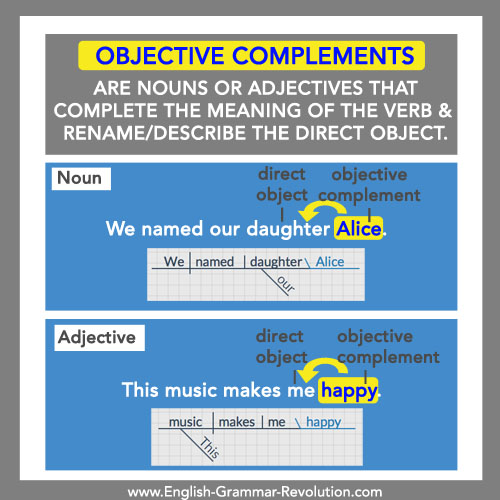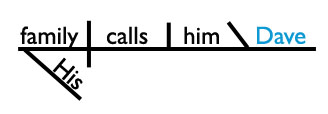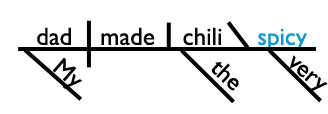Download your free grammar guide here.
Download your free grammar guide here.
What are objective complements?
What are objective complements?
- Home
- Parts of Speech
- Nouns
- Objective Complements
We're tackling a grammar topic that you've probably never heard of: objective complements.
Be sure to take the short quiz at the bottom of this page after you watch the video or read the lesson.
Let's start with an example. Can you identify the function of all of the words in the following sentence?
We named our daughter Alice.
We = pronoun & subject
named = transitive active verb
our = possessive pronoun/adjective
daughter = noun & direct object
Alice = ?

This was taken right after Alice was born.
If you've been studying grammar, you were probably able to identify Alice as a noun, but were you able to figure out what function Alice is serving in the sentence? Alice is something called an objective complement.
What is an objective complement?
An objective complement is a noun or adjective that completes the meaning of the verb and modifies, names, or renames the direct object. (Since these modify, name, or rename direct objects, you'll only find them in sentences that have direct objects. That also means the sentence will have a transitive active verb.)
When the objective complement is an adjective, its function is to describe the direct object. In the sentence below, the adjective happy is an objective complement describing me.
This music makes me happy.
When the objective complement is a noun, its function is to rename the direct object. In the sentence below, the noun mayor is an objective complement renaming the noun uncle.
They elected my uncle mayor.
Now I'm going to quiz you! Are you ready? Look at the sentence below and see if you can pick out the verb, the direct object, and the objective complement. For bonus points, figure out if the objective complement is a noun or an adjective.
We consider you good friends.
How did that go? Were you able to say that consider is the verb, you is the direct object, and friends is the objective complement? If you identified friends as a noun, you also get bonus points. Yay!
Objective Complements & The Expletive As
Sometimes, objective complements are introduced by the word as. In these cases, as is something called an expletive. In the world of grammar, an expletive is an empty word. It's a word that serves a function, but doesn't carry meaning. Here are two examples of expletives introducing objective complements.
I introduced him as Mr. O'Brien.
They elected my uncle as mayor.
Sentence Diagramming
Sentence diagrams are pictures of sentences. These pictures show us the structure of the sentence.
To diagram an objective complement (OC), extend the horizontal line that holds the subject, verb, and direct object. Draw a slanted line between the direct object and the objective complement.

 We named our daughter Alice.
We named our daughter Alice.If the objective complement is introduced by the expletive as, diagram as on a line floating above the objective complement and connect it to the objective complement slot with a vertical, dotted line.

 I introduced him as Mr. O'Brien.
I introduced him as Mr. O'Brien.Psst! There is another way that objective complements have been diagrammed, and I wanted to show you that as well. (I prefer the method above, but if you've already learned to diagram them this way, it's fine too.)


It's Time For A Quiz
Don't be a passive learner. The best way to learn something is to actively test yourself. Give it a try with the quiz below.
Directions
Identify each word in the following sentence. If you've already learned how to diagram sentences, you should also diagram them. You'll find the answers just below this section.
1. I painted my room red.
2. The students kept the room tidy.
3. His family calls him Dave.
4. My dad made the chili very spicy.
5. Margo dyed her hair pink.
Diagramming sentences and actively recalling what you're learning are two of the components in our most popular grammar program. You don't need to know any grammar to get started, so there's no need to be intimidated. Check it out if you'd like a done-for-you curriculum created and presented by yours truly.
Okay, are you ready to check your work?
Quiz Answers
1.

I painted my room red.
I = pronoun & subject
painted = transitive active verb
my = possessive pronoun/adjective
room = noun & direct object
red = adjective & OC
2.

The students kept the room tidy.
students = noun & subject
The = adjective
kept = transitive active verb
the = adjective
room = noun & direct object
tidy = adjective & OC
3.

His family calls him Dave.
family = noun & subject
His = possessive pronoun/adjective
calls = transitive active verb
him = pronoun & direct object
Dave = noun & OC
4.

My dad made the chili very spicy!
dad = noun & subject
My = possessive pronoun/adjective
made = transitive active verb
chili = noun & direct object
the = adjective
spicy = adjective & OC
very = adverb
5.

Margo dyed her hair pink.
Margo = noun & subject
dyed = transitive active verb
her = adjective
hair = noun & direct object
pink = adjective & OC
If you'd like to teach or learn grammar the easy way—with sentence diagrams—check out our Get Smart Grammar Program.
It starts from the very beginning and teaches you grammar and sentence diagramming in easy, bite-size lessons.

Hello! I'm Elizabeth O'Brien, and my goal is to get you jazzed about grammar.
This is original content from https://www.english-grammar-revolution.com/objective-complements.html
Our Free Guide Gives You A Fun Way
To Teach And Learn The Basics v

Elizabeth O'Brien is the creator of Grammar Revolution.
Her lessons are guaranteed to give you more confidence in your communication skills and make you smile. :)

